Items filtered by date: January 2024
Ingrown Toenails and Infection Control
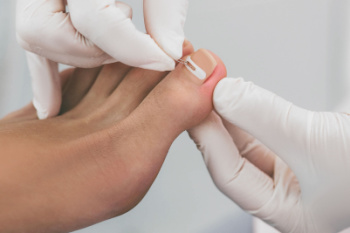
Ingrown toenails, a common foot ailment, occur when the nail's edge grows into the surrounding skin, leading to discomfort and potential infection. Effective infection control is critical in managing ingrown toenails. To prevent infections, it is important to maintain good foot hygiene. Keep your feet clean and dry, and trim your nails straight across to avoid sharp edges. Additionally, soaking your feet in warm, soapy water can help soften the nail and reduce inflammation. Wearing comfortable, well-fitting shoes that provide adequate toe space will help prevent ingrown toenails. In cases where an infection develops, or for severe or recurring ingrown toenails, it is suggested that you schedule an appointment with a podiatrist who can provide solutions, including possible nail removal.
Ingrown toenails may initially present themselves as a minor discomfort, but they may progress into an infection in the skin without proper treatment. For more information about ingrown toenails, contact Dr. John Branwell of Kearny, New Jersey. Our doctor can provide the care you need to keep you pain-free and on your feet.
Ingrown Toenails
Ingrown toenails are caused when the corner or side of a toenail grows into the soft flesh surrounding it. They often result in redness, swelling, pain, and in some cases, infection. This condition typically affects the big toe and may recur if it is not treated properly.
Causes
- Improper toenail trimming
- Genetics
- Improper shoe fitting
- Injury from pedicures or nail picking
- Abnormal gait
- Poor hygiene
You are more likely to develop an ingrown toenail if you are obese, have diabetes, arthritis, or have any fungal infection in your nails. Additionally, people who have foot or toe deformities are at a higher risk of developing an ingrown toenail.
Symptoms
Some symptoms of ingrown toenails are redness, swelling, and pain. In rare cases, there may be a yellowish drainage coming from the nail.
Treatment
Ignoring an ingrown toenail can have serious complications. Infections of the nail border can progress to a deeper soft-tissue infection, which can then turn into a bone infection. You should always speak with your podiatrist if you suspect you have an ingrown toenail, especially if you have diabetes or poor circulation.
If you have any questions, please feel free to contact our office located in Kearny, NJ . We offer the newest diagnostic and treatment technologies for all your foot care needs.
Neuropathy and Burning Feet
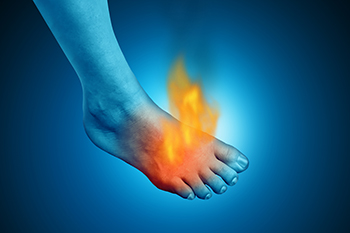
Experiencing a persistent burning sensation in your feet may indicate neuropathy has developed. The sensation of burning feet often results from nerve damage and is a common cause of this type of discomfort. While diabetes related neuropathy can be easily diagnosed, sudden or rapidly worsening unexplained burning sensations may necessitate comprehensive testing. Diagnostic measures include electromyography, or EMG, to assess muscle function, and nerve conduction studies to evaluate impulse transmission. In rare cases, a nerve biopsy may be conducted for microscopic examination. Laboratory tests such as blood, urine, or spinal fluid analysis may also help to identify underlying causes, such as vitamin E deficiency or uremia. Tailoring treatment for burning feet to the underlying cause is essential. For diabetic patients, treatment involves blood sugar control, insulin, diet changes, and oral medication. Alcohol induced neuropathy requires abstinence for nerve recovery. Chronic kidney failure may necessitate dialysis, and hypothyroidism calls for synthetic thyroid hormones. If you suspect neuropathy may be the cause of burning feet, it is suggested that you schedule an appointment with a podiatrist who is trained to manage foot conditions that stem from neuropathy.
Neuropathy
Neuropathy can be a potentially serious condition, especially if it is left undiagnosed. If you have any concerns that you may be experiencing nerve loss in your feet, consult with Dr. John Branwell from Kearny, New Jersey. Our doctor will assess your condition and provide you with quality foot and ankle treatment for neuropathy.
What Is Neuropathy?
Neuropathy is a condition that leads to damage to the nerves in the body. Peripheral neuropathy, or neuropathy that affects your peripheral nervous system, usually occurs in the feet. Neuropathy can be triggered by a number of different causes. Such causes include diabetes, infections, cancers, disorders, and toxic substances.
Symptoms of Neuropathy Include:
- Numbness
- Sensation loss
- Prickling and tingling sensations
- Throbbing, freezing, burning pains
- Muscle weakness
Those with diabetes are at serious risk due to being unable to feel an ulcer on their feet. Diabetics usually also suffer from poor blood circulation. This can lead to the wound not healing, infections occurring, and the limb may have to be amputated.
Treatment
To treat neuropathy in the foot, podiatrists will first diagnose the cause of the neuropathy. Figuring out the underlying cause of the neuropathy will allow the podiatrist to prescribe the best treatment, whether it be caused by diabetes, toxic substance exposure, infection, etc. If the nerve has not died, then it’s possible that sensation may be able to return to the foot.
Pain medication may be issued for pain. Electrical nerve stimulation can be used to stimulate nerves. If the neuropathy is caused from pressure on the nerves, then surgery may be necessary.
If you have any questions, please feel free to contact our office located in Kearny, NJ . We offer the newest diagnostic and treatment technologies for all your foot care needs.
What Causes Plantar Fasciitis?
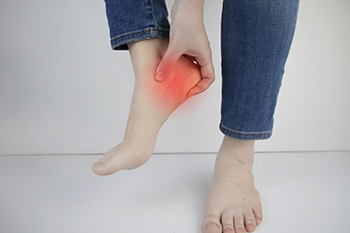
Plantar fasciitis, a prevalent foot condition, unfolds as a result of inflammation in the plantar fascia, a thick band of tissue that spans the bottom of the foot. This inflammation leads to symptoms that are distinctive yet often underestimated. A primary symptom is heel pain, particularly felt during the initial steps after periods of rest. The discomfort may also escalate after prolonged periods of standing or intense physical activity. The causes of plantar fasciitis are commonly rooted in excessive strain on the plantar fascia, due to activities like running, standing for extended periods, or inadequate footwear. Weight gain, tight calf muscles, and certain biomechanical issues can also contribute to the development of this condition. Recognizing the nuanced interplay of symptoms and causes is essential for prompt diagnosis and the implementation of effective strategies to alleviate pain. If you have heel pain, it is suggested that you consult a podiatrist for a diagnosis and an appropriate treatment plan.
Plantar fasciitis is a common foot condition that is often caused by a strain injury. If you are experiencing heel pain or symptoms of plantar fasciitis, contact Dr. John Branwell from Kearny, New Jersey. Our doctor can provide the care you need to keep you pain-free and on your feet.
What Is Plantar Fasciitis?
Plantar fasciitis is one of the most common causes of heel pain. The plantar fascia is a ligament that connects your heel to the front of your foot. When this ligament becomes inflamed, plantar fasciitis is the result. If you have plantar fasciitis you will have a stabbing pain that usually occurs with your first steps in the morning. As the day progresses and you walk around more, this pain will start to disappear, but it will return after long periods of standing or sitting.
What Causes Plantar Fasciitis?
- Excessive running
- Having high arches in your feet
- Other foot issues such as flat feet
- Pregnancy (due to the sudden weight gain)
- Being on your feet very often
There are some risk factors that may make you more likely to develop plantar fasciitis compared to others. The condition most commonly affects adults between the ages of 40 and 60. It also tends to affect people who are obese because the extra pounds result in extra stress being placed on the plantar fascia.
Prevention
- Take good care of your feet – Wear shoes that have good arch support and heel cushioning.
- Maintain a healthy weight
- If you are a runner, alternate running with other sports that won’t cause heel pain
There are a variety of treatment options available for plantar fasciitis along with the pain that accompanies it. Additionally, physical therapy is a very important component in the treatment process. It is important that you meet with your podiatrist to determine which treatment option is best for you.
If you have any questions, please feel free to contact our office located in Kearny, NJ . We offer the newest diagnostic and treatment technologies for all your foot care needs.
Heel Pain Can Be Treated!
Causes of Foot Arch Pain
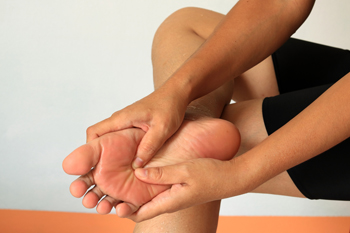
Foot arch pain is often due to prolonged pressure on the feet. Muscles and tendons that support the arches can become fatigued, leading to discomfort, especially for those with an active lifestyle. The most frequent cause of foot arch pain is plantar fasciitis, marked by damage to the thick band of tissue under the foot. It typically develops from altered foot biomechanics, bone spurs, and muscle tightness. Foot cramps, which affect 25 percent of individuals who are 60 and older, contribute to sudden, intense muscle spasms and arch pain. Tarsal tunnel syndrome, though less common, results from pressure on the tibial nerve, causing inner arch pain, pins and needles, and numbness. Plantar fibromatosis involves small nodules in the plantar fascia, causing a firm lump in the arch and pain with pressure. Posterior tibial tendonitis, often the result of overuse during high-impact activities, leads to pain on the bottom of the foot. Stress fractures, commonly caused by repetitive overloading during high-impact activities, result in sharp arch pain with localized bruising and swelling. Additionally, flat feet, where arches collapse, are linked to foot arch pain as well as knee and back pain. Custom orthotics can alleviate discomfort from foot arch pain. For a solution to foot arch pain, it is suggested that you schedule an appointment with a podiatrist.
If you have any concerns about your feet, contact Dr. John Branwell from Kearny, New Jersey. Our doctor can provide the care you need to keep you pain-free and on your feet.
Biomechanics in Podiatry
Podiatric biomechanics is a particular sector of specialty podiatry with licensed practitioners who are trained to diagnose and treat conditions affecting the foot, ankle and lower leg. Biomechanics deals with the forces that act against the body, causing an interference with the biological structures. It focuses on the movement of the ankle, the foot and the forces that interact with them.
A History of Biomechanics
- Biomechanics dates back to the BC era in Egypt where evidence of professional foot care has been recorded.
- In 1974, biomechanics gained a higher profile from the studies of Merton Root, who claimed that by changing or controlling the forces between the ankle and the foot, corrections or conditions could be implemented to gain strength and coordination in the area.
Modern technological improvements are based on past theories and therapeutic processes that provide a better understanding of podiatric concepts for biomechanics. Computers can provide accurate information about the forces and patterns of the feet and lower legs.
Understanding biomechanics of the feet can help improve and eliminate pain, stopping further stress to the foot.
If you have any questions please feel free to contact our office located in Kearny, NJ . We offer the newest diagnostic and treatment technologies for all your foot and ankle needs.
Common Reasons Why Feet Can Swell
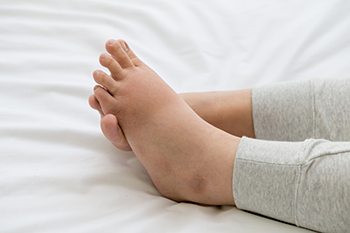
Swollen feet, a frequent and uncomfortable condition, can be triggered by a variety of factors. One of the most common causes is prolonged standing or sitting, which can cause fluid to accumulate in the lower extremities. Similarly, high salt intake can lead to water retention, resulting in swollen feet. Pregnancy is another well-known cause of foot swelling, due to increased blood volume and pressure on leg veins. Certain medications, like those for hypertension or hormone therapy, may contribute to edema. Injuries, such as sprained ankles or fractures, can also result in localized foot swelling. Additionally, underlying medical conditions like heart disease, kidney problems, or venous insufficiency can lead to edema in the feet. Lymphedema, a condition involving impaired lymphatic system function, is another possible cause. Recognizing the common causes of swollen feet is vital, as it can help you determine whether it is a benign issue or a sign of an underlying health problem. If you are concerned about persistent foot swelling, it is suggested that you consult a podiatrist for a proper diagnosis and guidance on managing the condition.
Swollen feet can be a sign of an underlying condition. If you have any concerns, contact Dr. John Branwell of Kearny, New Jersey. Our doctor can provide the care you need to keep you pain-free and on your feet.
Swollen feet are a common ailment among pregnant women and people who stand or sit for extended periods. Aging may increase the possibility of swollen feet and patients who are obese often notice when their feet are swelling too. There may be medical reasons why swollen feet occur:
- Phlebitis - A condition that causes the veins to become inflamed and can also cause leg pain.
- Liver disease - This may lead to low blood levels of albumin which is a protein. This can cause fluid in the blood to pass into the tissues and several areas of the body can become swollen.
- Heart failure - When the heart doesn’t pump properly the blood that is normally pumped back to the heart can pool in the veins of the legs causing swollen feet.
- Kidney disease - One of the main functions of the kidneys is releasing excess fluid in the body. This type of condition can make it difficult for the kidneys to function properly, and as a result the feet may become swollen.
- Deep-vein thrombosis (DVT)- This is a serious condition where blood clots form in the veins of the legs. They can block the return of blood from the legs to the heart which may cause the feet to swell. It is important to be treated by a podiatrist if this condition is present.
Swollen feet can also be caused by bone and tendon conditions, including fractures, arthritis, and tendinitis. Additionally, there may be skin and toenail conditions and an infection may cause the feet to swell. Patients who take medicine to treat high blood pressure may be prone to getting swollen feet.
Many patients elevate their feet to help relieve the swelling and this is generally a temporary remedy. When a podiatrist is consulted the reason behind the swelling can be uncovered and subsequently treated.
If you have any questions please feel free to contact our office located in Kearny, NJ . We offer the newest diagnostic tools and technology to treat your foot and ankle needs.

